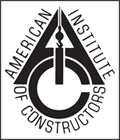AC, LEED GA credentials benefit construction science graduates
Two important professional credentials sure to benefit the career aspirations of construction science graduates are Associate Constructor (AC) certification and Leadership in Energy and Environmental Design Green Associate (LEED GA) certification.
AC certification requires a passing grade on an exam by fee-paying applicants who must have earned, or be pursuing, a bachelor’s degree in construction management. LEED GA certification also requires a passing grade on the exam, and engagement in, or completion of, an education program that addresses green building principles. These credentials are prerequisites to achieving advanced professional certifications as a LEED Accredited Professional (AP) or Certified Professional Constructor (CPC).
AC certification, for those pursuing a career in building, is “the most comprehensive program at this time for students,” said Stephen Byrne, a lecturer in the Department of Construction Science.
Byrne credits the department’s rigorous curriculum for the 88% pass rate realized on the AC exam by Texas A&M construction science students. The construction science degree program, he said, allows students to master the AC exam topics while establishing a solid foundation for a successful construction career.
Because sustainable construction, or “green building,” is an emerging construction industry concern, LEED certification is useful, said José Fernández-Solis, assistant professor of construction science, as it “denotes a job applicant’s potential use to a prospective employer in this important area of expertise.”
The [American Institute of Constructors] (http://www.professionalconstructor.org/Home/) administers the AC exam, which costs $155 for students and is given twice a year at a variety of testing facilities including Texas A&M University. The eight-hour exam consists of a writing assignment and approximately 300 multiple-choice questions. Exam categories include communication skills, engineering concepts, construction safety, and surveying and project layout among others.
“All of the questions on the exam cover something we learn at one point in our construction science courses,” said Ryan Bray, a senior construction science student who’s taken the AC exam.
The LEED GA exam, administered by the [Green Building Certification Institute] (http://www.gbci.org/homepage.aspx) , costs $200 — a $50 application fee plus a $150 exam fee. The test lasts two hours and 20 minutes and consists of 100 multiple-choice questions covering basic green building concepts. It can be taken online at any time.
There are a variety of ways to prepare for both exams.
The AIC provides a 673-page study guide for all registrants, which reviews topics that are also taught in the required construction science courses. Practice AC exams are also available to registrants.
An LEED GA exam study guide may be purchased from the [U.S. Green Building Council] (http://www.usgbc.org/DisplayPage.aspx?CMSPageID=1988) for $80.00. Also, at the Texas A&M College of Architecture, a four-evening LEED GA preparation class taught by graduate student Patrick Daniels, LEED AP, is offered. For information, contact Daniels at danielspatrickr@hotmail.com .
To learn more about the value of AC and LEED GA certifications or about the exams, visit the [AIC] (http://www.professionalconstructor.org/Home/) or [GBCI] (http://www.gbci.org/homepage.aspx) websites.
The next AC exam offered at Texas A&M is scheduled for Nov. 3, 2012 in Rudder Tower. Those interested can register on the [AIC website] (http://www.professionalconstructor.org/Home/) .
Tags
Related Posts
CoSci prof to lead summer program for South Texas youth

Former Air Force Academy educator heads CoSci dept.

Students display tiny homes on campus

Noted alum sharing expertise as TIAS Faculty Fellow

Tech’s impact on builders was focus of March 8 events
Follow Us
Facebook Twitter Vimeo Youtube Flickr RSS
Recent Posts

Planning prof heads study of disaster housing aid

A message from the dean

Former student remembered as expert planner

Leading educator named new head of Architecture Dept.






_thumbnail_small.png)
